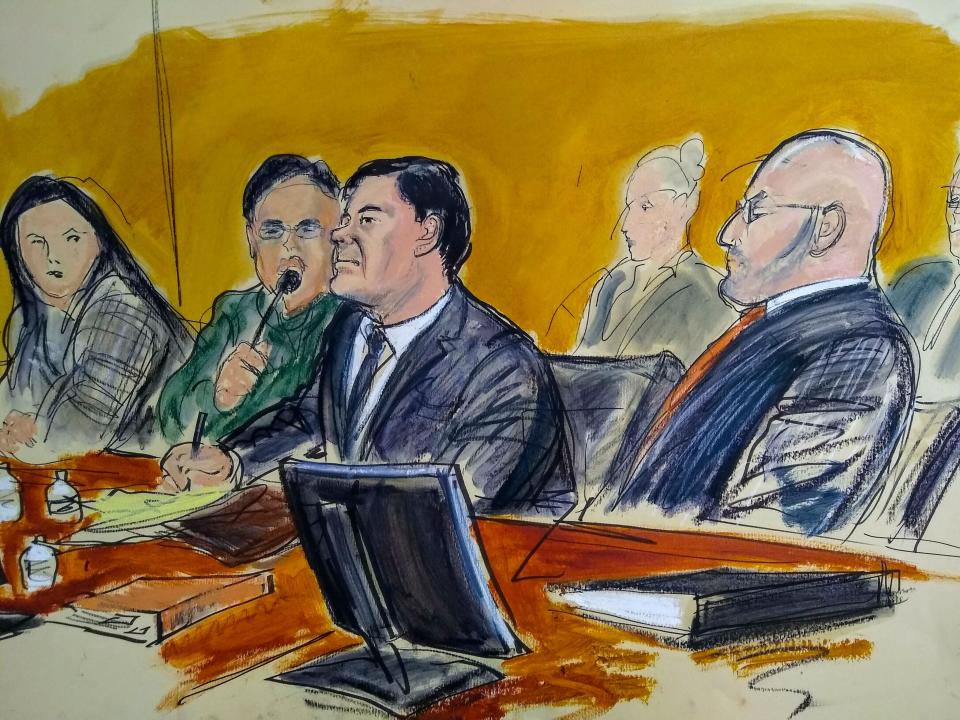El Chapo trial: Undocumented immigrant detained, ICE plans to deport
NEW YORK – Some visitors to trial have sacrificed vacation time, work and sleep in the hope of snagging scarce seats in the Brooklyn federal courthouse to see the alleged Mexican drug lord.
In a bizarre incident last week, one visitor gave up his personal liberty.
Reny Martinez Rivera joined media reporters and spectators in the early-morning line Thursday for the trial of the accused leader of Mexico's Sinaloa drug cartel.
Martinez made it into the eighth-floor trial courtroom. Then he sat in the area reserved for Guzmán's wife, Emma Coronel Aispuro.
A Mexican TV reporter noticed and asked about his seat selection. Martinez, speaking in Spanish, said he was from Milan, Italy, and indicated he had ties to Guzmán's family, plus several homes in Mexico. The puzzled reporter asked whether he had somehow been "Mexicanized."

At that point, a courtroom security marshal saw Martinez and ordered him to gather up his belongings and come to the courtroom door. Martinez refused, saying he was part of Guzmán's family or a family friend.
The marshal again instructed Martinez to come to the door, adding loudly: Now. He and other security officers took the visitor to an overflow courtroom, where visitors and reporters have been following the Guzmán trial via video and audio feeds.
Using Martinez's New York State driver's license, the marshals checked the visitor's identity and found a bench warrant for his arrest, a court spokesman said. They detained him and turned him over to Immigration and Customs Enforcement officers.
ICE said Martinez is a citizen of Spain who was in the United States illegally. The agency said he has "an extensive criminal history" here, including "multiple felony convictions."
Martinez lost his final legal bid to remain in the country in April 2006, the agency said.
"He is currently in ICE custody pending removal from the U.S.," the agency said in a statement.
As a result, Martinez wasn't in the courtroom Thursday when the jury of eight women and four men concluded a fourth day of deliberations without reaching a verdict. The panel is scheduled to resume deliberations on Monday morning.
What's taking the jury so long?
Federal prosecutors called 56 witnesses against Guzmán during the trial. Fourteen were alleged former associates of the accused drug lord. Their testimony supported other evidence presented by prosecutors to argue that Guzmán smuggled tons of cocaine and other drugs into the United States.
Guzmán's defense called just one witness. They focused their trial strategy on characterizing the government witnesses as liars who would say anything to win leniency for their own crimes.
Guzmán declined to testify in his own defense.
So why are Guzmán trial jurors, who are serving anonymously, starting their fifth day of deliberations on Monday?
The answer might lie in part in the 10-count superseding indictment prosecutors filed against Guzmán. The charges include participating in a continuing criminal enterprise, crime that could bring a life sentence in prison, drug trafficking, use of a firearm in tandem with drug-related crimes and money laundering.
Jurors must find that one or more legal requirements for each count has been met before they can vote on a conviction on that charge.
Making a determination one way or the other takes time.
Adding to the difficulty, a complex verdict sheet includes one or more alleged violations for each criminal count. The continuing criminal enterprise count alone has 27.
Jurors must determine whether prosecutors have proved the violations beyond a reasonable doubt.
That, too, takes time.
Additionally, getting answers to questions raised by jurors during their deliberations isn't necessarily an immediate process.
On Thursday afternoon, jurors asked to see a portion of the testimony of Juan Carlos Ramírez Abadía, a former Colombian drug cartel leader who said he was a major cocaine supplier for Guzmán.
Prosecutors and defense lawyers conferred. But they could not reach an immediate agreement on which parts of the trial transcript should be given to jurors.
U.S. District Judge Brian Cogan issued a decision Friday that overruled five defense objections and one government objection.
Jurors are expected to get the relevant Ramirez transcript Monday morning.
Proposed El Chapo Verdict S... by on Scribd
This article originally appeared on USA TODAY: El Chapo trial: Undocumented immigrant detained, ICE plans to deport

